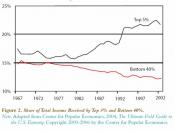Mid Term take Home Exam
Question 1:
The correlation between socioeconomic status and student performance has been consistent for as long as records have been maintained. Students from affluent backgrounds tend to do better in school and on standardized tests than students from economically disadantaged backgrounds. In the following paragraphs, I would like to present two different ways of understanding this pattern. I believe that both socioeconomic and genetic phenomena can be best explained such a persistence of this trend.
First, we can present the biological phenomenon as a way of understanding the pattern. In Schooling in Capitalist America by Bowles and Gintis, the authors stated that there has been a rival of the genetic interpretation of IQ scores. 'An explanation of the failure of egalitarian is thus found in the immutability of genetic structure.'(Bowles and Gintis 22) According to the statistical studies in the late 1960s and early 1970s, and interpretation of the role of IQ in the structure of inequality has been elaborated.
The conclusion drawn from the studies explain that the poor are poor due to their intellectual incompetence inherited form their poor and their intellectually deficient parents. However, some of he statistical results of this investigation show that it is a mistake to relate one's family background to socioeconomic differences in measured IQ. Despite the fact that there is a large increase in college enrollments, the probability of a high school graduate attending college is as dependent on parental socioeconomic status as it was thirty years ago. This suggests that the effect is not attributable to the genetic transmission of measured iQ while family background has an important effect on an individual's future economic success.
Secondly, I would like to explain the trend by using examples in Ain't No Makin' It by Jay MacLeod. MacLeod points...



great
great
0 out of 0 people found this comment useful.